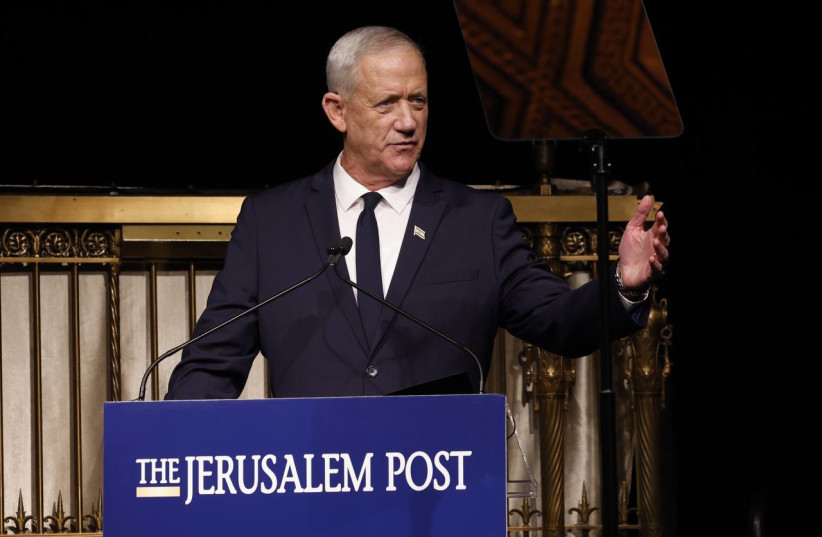Gantz said that he had placed the IDF on high readiness in terms of intelligence, offensive, and defensive operations in the north.

Defense Minister Benny Gantz threatened to destroy Lebanon if Hezbollah attacks Israel, but struck an optimistic note about the pending maritime gas deal between Israel and Lebanon, saying it was still on the table and could be concluded “within days.”
“Negotiations are continuing,” Gantz said in interviews he gave on Friday to Israeli news stations Channels 11 and 12. He spoke about a US-brokered deal that would set a maritime border in such a way as to allow for Israel to extract natural gas from the Karish rig and for Lebanon to operate in the neighboring Kana gas field.
Israeli media reported on Saturday night that the Defense Ministry had given the company Energean the green light to start testing the Karish rig, possibly as early as Sunday.
The terrorist group Hezbollah, which operates in Lebanon, has warned Israel against putting the Karish gas field in service, and the IDF is prepared to respond harshly in such an instance.
“Israel is prepared to reach a deal, but it is also determined to preserve its security and economic interests. In light of this, I have instructed the IDF to be prepared for an escalation that does not necessarily need to occur,” Gantz said in the interviews which were published on Saturday night.
Gantz said that he had placed the IDF on high readiness in terms of intelligence, offensive, and defensive operations in the north.

“If Hezbollah will make this mistake and attack Israel, in any way – by land, sea,or air – Israel will protect itself, attack them and if it turns into something wider, we will destroy Lebanon,” he warned.
However, he emphasized that the focus was on coming to an agreement with the government of Lebanon that would allow both countries to extract gas and which took into account both Israel’s economic and security interests. The deal would also benefit Lebanon economically, he said.
“I think that in the end, if we achieve an agreement with the Lebanese government, it is good for sides, and it is good for the stability of the region.”
Has Lebanon responded?
Lebanon issued a response to the agreement and Israel has made comments on that response and the talks are continuing, he said.
He added that it could be possible to bridge the differences within days, but that the formal conclusions of the talks could take longer.
Former prime minister Benjamin Netanyahu has attacked Prime Minister Yair Lapid and Gantz over the deal, warning that it is bad for Israel and that the current government had caved to all of Lebanon’s demands.
His words have been backed by former US ambassador to Israel David Friedman.
Gantz refuted the criticism, including by Friedman, that it was a bad deal and that Israel compromised completely on its interests. He stressed that it “protects our security, stabilizes the region, and pushes Iran from the area.”
Gantz on Saturday issued an invitation to Netanyahu for a briefing on the deal at the Defense Ministry headquarters in Tel Aviv.
At the US State Department on Friday, deputy spokesman Vedant Patel said that Special Presidential Coordinator Amos Hochstein, who brokered the deal, “is in touch with the parties and continues to work to resolve outstanding differences as the negotiation enters a final phase.
“We remain committed to reaching a resolution, and we firmly believe that a lasting agreement is possible and is within reach,” he said.
The French Foreign Ministry said that it was “actively contributing to American mediation aimed at reaching an agreement” which it said, “would benefit both countries and their peoples. It would contribute to the stability and prosperity of the region. We call on all actors to work on this.”
Both Israel and Lebanon had been hopeful that a deal would be reached, but negotiations had appeared to break down last week, with Lebanon issuing objections to a text that had initial approval from Lapid and Gantz.
According to a senior diplomatic source, one of the Lebanese demands that Lapid rejected was that Total Energy, the French petroleum giant that holds the license to develop the Kana gas field, buy out the portion of the reservoir in Israeli waters, whereas the proposal that Israel agreed to accept stated that Total would pay royalties to Israel for the gas extracted from its waters.
Shortly after Lapid’s decision was announced, the security cabinet authorized Lapid, Gantz and Alternate Prime Minister Naftali Bennett to take decisions if there were to be an escalation in the North. Gantz warned that Israel will defend its infrastructure regardless of the outcome of negotiations.
After putting the IDF on alert due to the falter in the maritime negotiations with Lebanon, Gantz spoke with the heads of regional authorities in Israel’s North on Friday.
Gantz was accompanied by Deputy Defense Minister Alon Shuster, the head of the National Emergency Management Agency Yoram Laredo, the commander of the Home Front Command’s Northern District Col. Bezalel Schnaid and Brig.-Gen. (res.) Alon Friedman, the former Northern Command chief of staff.
According to a statement released by his office, Gantz spoke to them about the latest developments as well as the defense establishment’s preparations.
“The defense minister emphasized that at this stage there are no special instructions for the home front and should there be, they will be informed in an orderly manner,” the statement said.
Among those he spoke with was the head of the Kfar Vradim regional council, the head of the Upper Galilee Regional Council, the mayors of Ma’alot Tarshiha, Nahariya, Kiryat Shmona, Katzrin and others.
According to Army Radio, the heads of the local authorities warned Gantz that “residents are not prepared for war” and that there was not enough safe rooms in their communities.
The north is home to about 244,000 Israelis, many of whom do not have access to a bomb shelter or plans for population evacuation, should a war break out, have yet to be completed.
The report said that they asked Gantz “not to get into unnecessary adventures” and that his statement on Thursday about preparing for escalations caused “unnecessary anxiety” for residents of the North.
As reported by The Jerusalem Post
